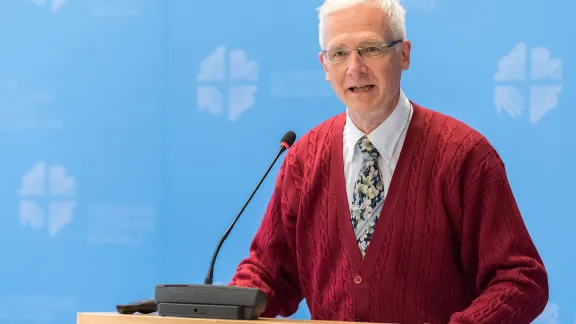Shedding old stereotypes while learning to trust and listen to other Christians’ stories: Jean-Daniel Plüss takes us inside the first international Lutheran-Pentecostal dialogue

Jean-Daniel Plüss, Chair of the European Pentecostal Charismatic Research Association and co-chair of the first international dialogue between the LWF and the Pentecostal World Fellowship. Photo: LWF/A. Hillert
Jean-Daniel Plüss, co-chair of the first Lutheran-Pentecostal dialogue, shares insights on the road to Christian unity
(LWI) - “We want to be relevant and we need to see that if we are bickering about our differences, we are not credible to young people today.” That is the conviction of Swiss ecumenist Jean-Daniel Plüss, Chair of the European Pentecostal Charismatic Research Association and co-chair for the Pentecostal World Fellowship of the first ever international dialogue with the Lutheran World Federation (LWF).
That dialogue, in Plüss' own words, was “a long time in the making.” Its origins lie back in the 1990s at a time of lingering mutual mistrust between the older, mainline churches and the newer, more Spirit-led movements. Initial contacts between former LWF General Secretary Rev. Dr Gunnar Stålsett and Pentecostal professor Cecil M. Robeck led to the establishment of an informal group which met five times over the following decade at the Strasbourg Institute for Ecumenical Research in France.
Under the guidance of Plüss and Lutheran professor Kenneth Appold from Princeton Theological Seminary, the group explored basic differences and common beliefs between churches that are members of the two global Christian communions. Gradually, as they explored “the foundations of our self-understanding,” Plüss says, “we realized that despite our very different histories and traditions, it is our identity in Christ that draws us together.”
Discovering the same Spirit at work created a willingness to shed stereotypes, as we learned to trust and listen to each other's stories.
Jean-Daniel Plüss, Chair of the European Pentecostal Charismatic Research Association
At first glance, as the first Lutheran-Pentecostal dialogue statement points out, the two traditions “appear to be so different that they would have little in common.” Lutheran churches are confessional, Pentecostal churches are not, while worship styles and organizational structures can also appear to be a world apart. Yet, as the group looked more closely at differences within their own communions, they discovered “the same Spirit at work, creating a willingness to shed stereotypes as we learned to trust and listen to each other's stories.”
Plüss has been interested and engaged in ecumenical dialogue since his student days. “My family roots are with the Huguenots from southern France who fled as refugees to Switzerland in the 16th century,” he says. “I grew up in the Reformed church but as a teenager, I got in touch with the Pentecostals. I felt a call to ministry and began my studies at a Pentecostal college but then went on to do a PhD at the Catholic University of Louvain.”
In the 1970s, he recalls, “with the charismatic renewal movement in full swing, we had prayer meetings with people from very many different churches and I was well received at the Catholic university. I felt a lot of goodwill and interest, so I also wanted to learn more about the beliefs of those with different religious backgrounds from my own.”
Learning from others to know ourselves better
Learning from others in order to understand and appreciate one’s own tradition is a recurring theme throughout the first international Lutheran-Pentecostal dialogue which Plüss co-chaired between 2016 and 2022. “It is a beautiful story of getting to know each other and ourselves better,” he reflects.
Meetings took place each year on different continents to explore issues that were relevant to the local context. “In Chile, we talked about poverty, because Pentecostalism is a church for the poor, but Lutherans also have a diaconal ministry for the poor and we saw how much we have in common. In Madagascar, we spoke about healing and deliverance, how Pentecostals pray for people to be delivered from oppression, but we saw that Lutherans too have a deliverance ministry similar to ours.”
Despite a hiatus during the pandemic, a final report was published in 2023 recommending the initiation of a second phase of dialogue, possibly focused on ways of worship that differ greatly, both within and between the two communions. “In Ethiopia, Lutherans may worship very differently from elsewhere, or in Russia, for example, Pentecostals have been heavily influenced by the Lutheran church, so maybe we can learn to understand our own constituents better,” Plüss says.
Ethical evangelism, relevant witness
The report, called ‘The Spirit of the Lord is Upon Me’ is written in a user-friendly style, “so that both church families can draw benefit and local pastors can share testimonials of mutual learning.” It explores typical areas of tension such as proselytism, noting that both sides have used “dishonest and dishonorable forms of mission.” It says: “We are dismayed when missionaries carry out their programs in total ignorance of local culture or history. We are frustrated and ashamed when Christians attempt to ‘evangelize’ members of other churches as if those churches simply did not exist.”
Plüss says it has been "very good to talk about proselytism and ask how we can ethically engage in sharing the gospel with the world.” Pentecostals, with their “more dynamic styles of evangelism need to learn to do so in a responsible way to respect the life of other churches, while Lutherans may want to ask themselves why people prefer to worship in Pentecostal churches.”
Reflecting on the theme of the recent LWF Assembly, ‘One Body’ One Spirit, One Hope’, Plüss says "I am hopeful that when we can see we are one in Christ and that there is only one Spirit calling us into mission, we will become more aware of what God is doing through the other churches.” He concludes: “As we discover our ultimate identity in Jesus Christ, I think we will grow together in unity, making our shared witness to the world more relevant.”


